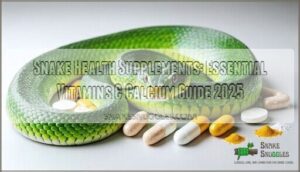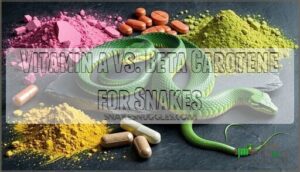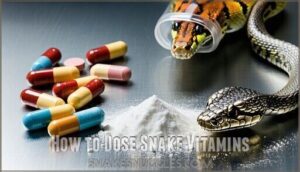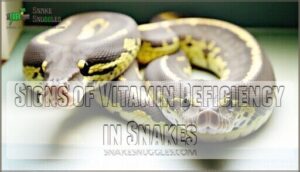This site is supported by our readers. We may earn a commission, at no cost to you, if you purchase through links.
 Your snake’s health depends on proper snake health supplements and vitamins, especially calcium with D3 for bone strength and metabolism.
Your snake’s health depends on proper snake health supplements and vitamins, especially calcium with D3 for bone strength and metabolism.
Most captive snakes need calcium dusting on prey items since whole prey doesn’t always provide adequate levels.
Vitamin A supports immune function and skin health, while B-complex vitamins aid digestion.
Over-supplementation can be just as dangerous as deficiency, so follow dosing guidelines carefully.
Quality brands like Zoo Med and Exo Terra offer species-specific formulations that take the guesswork out of supplementation.
The trick isn’t just knowing what supplements to use, but understanding when your snake actually needs them.
Table Of Contents
- Key Takeaways
- Why Snakes Need Calcium Supplements
- Choosing The Right Snake Vitamins
- Essential Nutrients for Snake Health
- Snake Supplements for Specific Needs
- How to Use Snake Supplements Safely
- Frequently Asked Questions (FAQs)
- What supplements should I give my snake?
- What supplements do reptiles need?
- Do snakes need a calcium supplement?
- What is the best calcium supplement for reptiles?
- What are the best vitamins for snakes?
- Should I give my snake supplements?
- What supplements do ball pythons need?
- Why do snakes need vitamin D3?
- Are all snake supplements necessary for every breed?
- What are signs of over-supplementation in snakes?
- Conclusion
Key Takeaways
- You’ll need calcium with D3 as your snake’s foundation supplement – dust prey items regularly since up to 60% of captive snakes develop calcium deficiency and metabolic bone disease without proper supplementation.
- Don’t guess at dosing – precision prevents poisoning – use digital scales for accurate measurements and follow manufacturer guidelines, as vitamin D3 toxicity and over-supplementation can cause organ damage and kidney failure.
- Choose quality reptile-specific brands over generic options – Rep-Cal, Zoo Med, and Exo Terra offer species-specific formulations that take the guesswork out of proper calcium-phosphorus ratios and vitamin A levels.
- Watch for deficiency warning signs before they become serious – lethargy, shedding problems, bone deformities, and vision issues signal that your snake needs immediate supplement adjustments and veterinary attention.
Why Snakes Need Calcium Supplements
Your snake’s bones and muscles depend on calcium to stay strong and function properly.
Without adequate calcium supplementation, captive snakes often develop metabolic bone disease and other serious health complications that can be life-threatening.
Importance of Calcium in Snake Diet
Beyond supporting bone structure, calcium serves as your snake’s metabolic foundation for proper muscle contractions and nerve function.
Without adequate dietary calcium, your reptile faces serious health risks that develop silently over time.
- Calcium Sources: Dusting prey with high-quality calcium supplement guarantees consistent intake
- MBD Prevention: Regular supplementation prevents devastating metabolic bone disease complications
- Dosage Accuracy: Proper calcium ratios support ideal snake health and skeletal development
Calcium Deficiency in Snakes
Your snake’s skeleton relies on adequate calcium to stay strong, but calcium deficiency strikes up to 60% of captive snakes.
Without proper calcium, your snake’s bones become dangerously soft and weak.
Without enough calcium, your pet faces metabolic bone disease, which causes bone deformities and weakness. Poor diets and inadequate supplementation are the main causes of deficiency.
Key signs to watch for:
- Lethargy and reduced activity levels
- Difficulty shedding or incomplete sheds
- Bone deformities or soft, bendable bones
- Muscle tremors or seizures
- Poor appetite and weight loss
Diagnosing deficiency requires veterinary X-rays to spot bone density issues. Treating deficiency involves immediate calcium supplementation and dietary changes.
Preventing deficiency means regularly dusting prey with quality calcium supplements.
Role of Vitamin D3 in Calcium Absorption
Vitamin D3 functions as your snake’s calcium gatekeeper, controlling how much gets absorbed from food.
Without adequate UVB exposure, your snake develops D3 deficiency, blocking calcium absorption completely.
This creates a domino effect leading to calcium deficiency and poor bone development.
Snake health supplements containing vitamin D3 help, but watch supplement dosage carefully—toxicity risks from overdosing can damage organs.
Choosing The Right Calcium Supplement for Snakes
Rep-Cal and other calcium sources come in powder or liquid forms, with many including D3 for enhanced absorption.
You’ll want calcium powder that maintains the proper calcium-phosphorus ratio your snake needs.
Calculate dosage based on your snake’s size and feeding schedule.
Don’t guess – veterinary oversight guarantees you’re not overdoing it.
Quality calcium supplements prevent metabolic bone disease effectively.
To confirm proper absorption, consider dusting prey items with calcium powder.
Choosing The Right Snake Vitamins
When you’re selecting vitamins for your snake, you’ll need to understand the difference between synthetic vitamin A and safer beta-carotene options.
Getting the right supplement isn’t just about picking any bottle off the shelf—it’s about matching your snake’s specific needs with quality products that won’t cause toxicity issues.
Vitamin a Vs. Beta Carotene for Snakes
Your snake can’t efficiently convert beta carotene into usable vitamin A like other animals can.
This conversion efficiency problem means beta carotene benefits won’t prevent vitamin A toxicity risks from poor dietary sources.
Choose reptile supplements with preformed vitamin A in powder or liquid supplement forms for reliable snake health and proper snake vitamins absorption.
Deficiencies are common, especially in insect-eating reptile species.
Recommended Vitamin Supplements for Snakes
Quality snake vitamins can make the difference between a thriving pet and ongoing health problems.
You’ll want to choose supplement brands carefully for ideal results.
- Rep-Cal Herptivite offers balanced nutrition without causing vitamin A toxicity
- Zoo Med Reptivite provides thorough vitamins in powder form for easy dusting
- Arcadia RevitaliseD3 combines essential vitamins with proper calcium ratios
- Liquid vitamins work well for snakes that won’t eat dusted prey items
Store your reptile vitamins in cool, dry places to maintain potency.
Vet recommendations often favor powder vitamins over liquid for consistent dosing.
Maintaining the correct calcium phosphorus balance is also vital for preventing health issues.
How to Dose Snake Vitamins
Getting accurate dosage measurement right prevents vitamin overdose and keeps your snake healthy.
Start with manufacturer guidelines, then adjust for your snake’s size and species.
Powder forms offer better dosage calculation than liquids for most supplement types.
Store supplements properly and track administration methods – weekly dusting works for most adults, while juveniles need more frequent adjustments.
Signs of Vitamin Deficiency in Snakes
Spotting vitamin deficiencies in your snake isn’t rocket science, but it requires a keen eye. Lethargy, shedding problems, vision impairment, appetite loss, and bone deformities signal trouble ahead.
One key indicator can be stargazing neurological problems.
Key warning signs include:
- Lethargy signs – Your snake moves like it’s stuck in molasses
- Shedding problems – Incomplete or stuck shed pieces clinging stubbornly
- Vision impairment – Cloudy eyes or difficulty striking prey accurately
- Bone deformities – Curved spine or soft, bendable bones
Proper snake vitamins and snake supplements prevent these snake health issues before they become serious vitamin deficiencies.
Essential Nutrients for Snake Health
Your snake’s body runs on more than just prey—it needs a careful balance of proteins, electrolytes, and beneficial bacteria to thrive in captivity.
Understanding these essential nutrients helps you bridge the gap between what wild snakes get naturally and what your pet needs to stay healthy and strong.
Protein and Amino Acids for Snake Growth
While vitamins get the spotlight, protein and amino acids are your snake’s building blocks for healthy snake growth. Think of them as the construction crew—without quality materials, you can’t build a strong house.
Most whole prey meets Growth Requirements perfectly, but young snakes or those recovering from illness might need extra support. Amino Sources from varied prey types guarantee complete profiles for maximum Protein Digestion. Facilitating proper hydration is also key, as humidity impacts hydration and digestive health.
| Growth Stage | Protein Needs |
|---|---|
| Juvenile | High protein (20-25%) |
| Adult | Moderate protein (18-20%) |
| Breeding | Increased protein (22-24%) |
Watch for Deficiency Symptoms like slow growth or poor muscle development. Supplement Options include reptile protein powders when whole prey isn’t enough.
Importance of Electrolytes and Probiotics
Your snake’s internal systems work like a finely tuned machine, and electrolytes and probiotics keep everything running smoothly.
Electrolytes maintain hydration support and enable proper muscle function, while probiotics promote gut flora balance for ideal snake digestion.
Here’s what these powerhouse supplements do:
- Regulate hydration – Reptile electrolytes prevent dehydration-related health issues
- Enhance digestion – Probiotic supplements improve nutrient absorption
- Boost immunity – Healthy gut bacteria strengthen disease resistance
- Support recovery – Essential after illness or antibiotic treatment
- Maintain balance – Species variations require customized immune boosting approaches
Think of probiotics as your snake’s personal gut health bodyguards, fighting off harmful bacteria while supporting digestion enhancement.
How to Provide a Balanced Diet for Snakes
Your snake’s snake diet thrives on prey variety—think mice, rats, chicks, and quail.
Match feeder size to your snake’s girth, and don’t forget feeder gut-loading for extra nutrition.
Hydration importance can’t be overstated—fresh water should always be available.
Encourage natural behaviors through environmental enrichment while supplementing with quality snake vitamins and reptile supplements for ideal snake health.
Snake Supplements for Specific Needs
Different snake species have unique nutritional requirements that go beyond basic calcium and vitamins.
You’ll find that ball pythons, insectivorous snakes, and snakes with health conditions each need targeted supplement approaches to thrive in captivity.
Supplements for Ball Pythons
While ball pythons thrive on whole prey diets, certain life stages demand extra nutritional support. Young, growing snakes and breeding females face increased calcium needs and benefit from targeted snake supplements.
Here’s your supplementation roadmap:
- Dust prey monthly with reptile-specific calcium plus D3 for adults
- Increase frequency weekly for juveniles and gravid females
- Monitor for deficiency signs like poor shedding or lethargy
D3 importance can’t be overstated—it facilitates calcium absorption when UVB lighting isn’t available. Many owners find it convenient to source python supplements online.
Quality supplement types like Rep-Cal provide balanced nutrition. Always follow dosage guidance and maintain health monitoring through regular vet checkups.
Supplements for Insectivorous Snakes
Feeding insectivorous snakes requires strategic planning beyond basic prey selection.
Gut-loading insects with calcium-rich diets 1-3 days before feeding dramatically improves nutritional value.
Dust crickets and roaches with calcium powder plus reptile vitamins weekly for juveniles, monthly for adults.
Popular specific brands like Rep-Cal provide essential nutrients missing from captive insects.
Avoid wild-caught insects unless pesticide-free—your snake’s health depends on proper supplement types and dosage guidelines.
Supplements for Snakes With Health Issues
When your snake faces health issues, targeted snake health supplements can speed recovery.
MBD treatment requires calcium plus D3, while anorexia support includes appetite stimulants and B-vitamins.
Shedding problems respond well to humidity aids and vitamin A.
Immune boost formulas help fight infections, and probiotic therapy restores gut balance after illness.
Vitamin D3 is essential for calcium absorption.
Always consult your snake veterinarian before starting any supplement regimen.
How to Use Snake Supplements Safely
While supplements can boost your snake’s health, too much of a good thing becomes dangerous fast.
You’ll need to master the art of precise dosing and smart administration techniques to keep your slithery friend thriving without accidentally poisoning them.
Risks of Over-Supplementation in Snakes
Too much of a good thing can turn dangerous fast. Vitamin toxicity and hypercalcemia from excessive supplementation can cause serious organ damage in your snake.
Here’s what goes wrong with oversupplementation:
- Vitamin D3 toxicity leads to kidney failure and tissue calcification
- Supplement interactions create dangerous nutrient imbalances
- Poor dosage calculation causes accidental vitamin overdose
- Signs of oversupplementation include lethargy, weight loss, and organ dysfunction
Your snake’s health depends on precision, not guesswork.
How to Avoid Accidental Overdose
Preventing vitamin overdose starts with precise dosage calculation – measure supplements with digital scales, not guesswork.
Check for supplement interactions when combining products, and watch for toxicity signs like lethargy or organ dysfunction.
Safe storage away from heat preserves potency and prevents accidental double-dosing.
When in doubt, vet consultation beats risky assumptions about hypercalcemia or vitamin D3 toxicity.
Tips for Administering Supplements to Snakes
Administering snake supplements safely starts with accurate dosage measurement using digital scales.
Dust prey items evenly in feeding containers or plastic bags for consistent supplement dosages.
Choose between powder and liquid supplement forms based on your snake’s needs.
Consider snake supplement sources for specialized products for guidance.
Mixing supplements with food works better than oral administration.
Follow proper dosing frequency guidelines and consider veterinary consultation for personalized snake health supplements advice.
Frequently Asked Questions (FAQs)
What supplements should I give my snake?
You’ll want calcium powder and a multivitamin supplement specifically designed for reptiles.
Dust your snake’s prey items with calcium powder containing D3 every few feedings, and use multivitamins monthly to prevent deficiencies.
What supplements do reptiles need?
Studies show calcium deficiency affects 60% of captive snakes.
Your reptile needs calcium with D3, multivitamins, and vitamin A supplements.
Dust prey items regularly to prevent metabolic bone disease and support healthy growth.
Do snakes need a calcium supplement?
Yes, you’ll need calcium supplements for your snake.
Calcium deficiency affects up to 60% of captive snakes, causing metabolic bone disease.
Dust prey with calcium powder before feeding to guarantee proper bone development and muscle function.
What is the best calcium supplement for reptiles?
Think of calcium as your reptile’s foundation stone – without it, their entire structure crumbles.
Rep-Cal and Zoo Med’s calcium with D3 consistently top veterinarian recommendations, offering proven bone support that’ll keep your scaly friend strong and healthy, with calcium being crucial for their well-being.
What are the best vitamins for snakes?
Rep-Cal Herptivite and ReptiVite stand out as top vitamin supplements for your snake.
You’ll want multivitamins with vitamin A, D3, and calcium for bone health, plus B-complex vitamins for energy metabolism and immune support.
Should I give my snake supplements?
A ball python named Charlie nearly died from metabolic bone disease because his owner didn’t know captive snakes need calcium supplements—their prey lacks wild nutrition.
Yes, you should supplement your snake’s diet. Captive snakes can’t get complete nutrition from store-bought prey alone, making targeted supplementation essential for preventing deficiencies and maintaining ideal health.
What supplements do ball pythons need?
Your ball python needs calcium with vitamin D3 for strong bones, plus a multivitamin containing vitamin A for healthy vision and skin.
Dust prey items monthly with these supplements to prevent deficiencies.
Why do snakes need vitamin D3?
Like a key opening calcium’s door, vitamin D3 helps your snake’s body absorb calcium from food. Without it, you’ll see weak bones, muscle problems, and metabolic bone disease developing quickly.
Are all snake supplements necessary for every breed?
No, supplements aren’t universally necessary across all snake breeds.
Your species’ natural diet, captivity conditions, and individual health determine specific needs.
Some snakes thrive on varied prey alone, while others require targeted supplementation for peak health, and it’s crucial to understand that individual health plays a significant role in these determinations.
What are signs of over-supplementation in snakes?
Your snake’s literally drowning in vitamins when you spot lethargy, organ damage, hypercalcemia, or vitamin D3 toxicity. You’ll notice poor appetite, abnormal behavior, and potential organ failure from overdosing supplements.
Conclusion
Coincidentally, many snake health issues stem from the same root cause: inadequate snake health supplements and vitamins.
You’ve learned that calcium with D3 prevents metabolic bone disease, while vitamin A supports immunity and proper shedding.
Remember, whole prey doesn’t always provide complete nutrition, especially for picky eaters or those on limited diets.
Don’t wing it with dosing—follow manufacturer guidelines and watch for deficiency signs, as your snake’s vibrant health depends on getting supplementation right, not overdoing it, to prevent issues like metabolic bone disease.
- https://www.webmd.com/balance/bee-pollen-benefits-and-side-effects
- https://heartysol.net/how-to-make-homemade-flower-food-for-lasting-fresh-flowers/
- https://www.lugarti.com/reptile-diet-nutrition/203-ultra-premium-reptile-vitamins-without-dhtml
- https://animals.mom.com/snakes-need-vitamins-10902.html
- https://vcahospitals.com/know-your-pet/snakes-feeding















